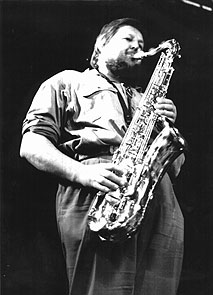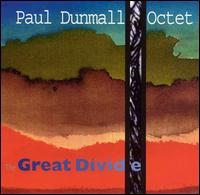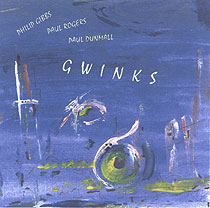

Courtesy of Paul Dunmall
Photo by Anita Cochrane

Cuneiform Records

A FIRESIDE
CHAT WITH PAUL DUNMALL
Since I am having such a hard time finding free improv heroes outside
of Chicago in the States, I turn across the Atlantic to Europe. One of
the European improvisers that has caught my ear is Paul Dunmall, a saxophone
and bagpipe extraordinaire. The following is part one of as many parts
as Dunmall wants of our conversation together, as always brought to you
unedited and in his own words.
FRED JUNG: Let's start from the beginning.
PAUL DUNMALL: My father was a very good semi pro drummer and my grandmother
had a lovely singing voice and very good ear. As a young boy, my father
taught me drum rudiments and let me play his kit. I started clarinet lessons
when I was twelve and slowly enjoyed playing music more and more. I was
taught to play classical clarinet, but I also remember that I always improvised
as well as doing scales and studies. It just seemed the natural thing
to do, to enjoy your instrument and the sounds that it produced plus making
your own music up. Once you have tasted the joys of music making and the
feeling that it creates, it's hard to stop and that's what I have been
doing since those early days many years ago.
FJ: Influences?
PAUL DUNMALL: As a teenager, I listened to most of the greats, but eventually
Coltrane stood out for me, although I listened a lot to Albert Ayler,
Roland Kirk, Pharoah Sanders, Charlie Parker and later to Johnny Griffin,
Dexter Gordon, Sonny Rollins and Wayne Shorter.
FJ: You left school at an early age to work in an instrument repair shop,
seems like drastic measures.
PAUL DUNMALL: By the time I left school I was already gigging in a soul
band playing Otis Redding tunes, etcetera, but of course there wasn't
enough work to earn a living, so I got a day job repairing saxophones,
which I must say has been invaluable to me over the years in looking after
my horns. Also, because Bill Lewington's was the main saxophone shop in
London, all the top players use to bring their instruments in for repair.
Ronnie Scott's Jazz Club was just down the road. I got to look at many
of the greats' horns. One week I would be holding Ben Webster's tenor,
the following week, it would be Roland Kirk's King Super 20 tenor. I wasn't
good enough to repair them, but I hoped some of their magic would rub
of on me. I was only fifteen.
FJ: When did you turn professional?
PAUL DUNMALL: I turned professional at seventeen to join a progressive
rock band called Marsupilami in 1970. I saw an ad in the Melody Maker
and went for it. We played together for one year and then the band broke
up. I had to get a day job and do the odd gig as it came in until I got
into Divine Light Mission and went to live in an ashram in London.
FJ: What was the improvised music scene like in London at the time?
PAUL DUNMALL: As far as the improvised music scene was concerned, I didn't
know much about it. I remember seeing John Stevens, Mike Osborne and heard
about Tony Oxley and I was playing free music myself with a few friends,
but I put most of my energies into learning about meditation for several
years.
FJ: You moved in an ashram in America along with a spiritual movement
led by the Maharaj Ji. How did that period of solace lend to your spirituality?
PAUL DUNMALL: Living in an ashram was a great experience. You don't get
much personal space, but you do get to know how to learn to live with
people. Everything is shared and there's a great communal spirit. It was
a joyful time and at the end of the day, we all sat in the meditation
room and meditated, which brought a very peaceful and calm feeling to
the whole house. All I owned in those days was my tenor and clarinet.
Nowadays, I have a house full of stuff. My commitment to spirituality
has not diminished. It just changes in the way I view it. If you're a
person who believes that this universe is a random accident, then that
is fine. For me, that doesn't make any sense, so I work on trying to be
a better spiritual person, trying not to harm anyone and bring some joy
or thought provoking music into the world that has a spiritual base free
from religion or flag waving.
FJ: Spirituality beset the music of Coltrane in his later years. Do you
find any similarities to what he was trying to find and what you were
striving towards?
PAUL DUNMALL: Yes! Coltrane was the person that showed me through music,
you could change people's lives for the better. He did that for me and
in my own small way, I believe I'm continuing in that spirit. I'm also
very aware that I don't want to copy his music. It's very important that
I have found my own voice. I try to convey this spirituality not just
through the saxophone. That is why I took up the bagpipes. There's a lot
to be said on that instrument. The bagpipes are found in many cultures
that go back hundreds, if not thousands of years, and to bring this instrument
screaming into the 21st century is something I'm really working on.
FJ: While in the States, did you continue playing?
PAUL DUNMALL: When I was in America, I think that's where I found that
I could actually have something to say on the saxophone. I use to play
all day, practicing playing over chords, studies, high notes, tone development,
etcetera, etcetra. I played with many musicians including Latin bands,
rock and funk. I toured and recorded with Johnny "Guitar" Watson
for a year. I did some playing with Alice Coltrane in a big band situation
and for those who have heard this story before in other interviews, I
apologize. I was nineteen or twenty and during one of the band's rehearsals,
she asked me to play a solo, which of course I certainly jumped at. I
tried to blow the ceiling of the room off and when I had finished she
said to me, "When Coltrane and Pharoah Sanders played that intense
free playing they were calm inside." I never forgot what she said
and it made a strong impression on me and even now those words are true.
To get that intensity, you must be in control of what you doing, but you
must be 100% committed and give all. It was probably some throwaway line
she said to a young enthusiastic kid, but I thank her for it. I thoroughly
enjoyed my time in the States. I saw many great jazz musicians and concerts,
including the legendary San Francisco concert with Roland Kirk, Freddie
Hubbard, McCoy Tyner, Ron Carter, and Elvin Jones. Roland Kirk played
so fantastic! After three years, I had a feeling that I must go back to
Europe and when JGW got a European tour, it all fell in place. That was
1976. I didn't return until 1992, when I did a concert in Chicago with
the London Jazz Composers Orchestra.
FJ: Let's talk about your time with the London Jazz Composers Orchestra.
PAUL DUNMALL: I thought to get chosen for this band, I must be doing something
right. I've always admired Barry's energy and commitment. There was a
great feeling in the band, a lot of laughing which is always a good sign.
We used to work very hard to get the music right. I use to love to get
stuck in when I got a solo. Riding over the Orchestra, you needed plenty
of stamina and energy. I think what I learned from a composing point of
view was try to keep the music simple. It always brings the best results.
Let the music breath and be flexible. That is what I've tried to do with
my octet. If there is a written passage that's not happening, don't be
afraid or precious about changing it or even scrapping it altogether.
FJ: And Mujician?
PAUL DUNMALL: Well, Mujician is a special group for me. We have known
each other for over twenty years. When Mujician formed in 1988, it seemed
the natural thing to do. Some of my greatest musical experiences have
come from this band. We have sometimes hit the dizzy heights of musical
glory that I think you can only get when each group member is a master
of their instrument, but is also open to letting the music take over.
You try not to get in the way. It takes total concentration from the musicians
plus that magical atmosphere when you say to yourself, "Where did
that come from?" That is why I play music. From pin drop quiet to
flat out intensity, a charged atmosphere of searching, what more could
you want?
FJ: Mujician is a totally free improvisational group or collective, a
mounting challenge to go on stage or to record with no music preconceived
or prewritten. How does that inspire and improve the abilities of its
members?
PAUL DUNMALL: I will try to explain as much as I can, Fred. When Mujician
walks onto a stage, nobody in the group knows who is going to start, or
what notes or key, whether it will be slow or fast, in time or out of
time, quite or loud. We just trust that whatever happens, it will be right.
You really have to tune in with all your being and see where the music
takes you. Even the room will influence how you play, such as a concert
hall or a small jazz club. We all completely trust each other, so whatever
anybody plays will add to the performance. That is our aim. Sometimes
it's so easy, everything seems to fall into its right place and other
times it's hard and you dig deep to find that musicality and energy that
binds you together to make an uplifting concert. It is such a joy to make
music like this. It is only one branch of the jazz tree, but in Mujician
you can hear folk, contemporary classical, swing, avant-garde. We all
bring our years of playing in different music to new heights in this band.
That's why I can play clarinet, bagpipes whatever I want and it will fit.
It is pure improvised music, only restricted by our own individual limitations.
To have the chance to have such freedom to express yourself fully and
yet be part of this tight knit group trying to go ever deeper in this
music is the greatest feeling when playing for me.
FJ: How have your collaborations with Elton Dean helped facilitate your
own advancement?
PAUL DUNMALL: Elton is a kindred spirit, totally committed to the art
of improvising. We have played many gigs together and it is always great.
I remember one gig we did in the 1980s. It was a quartet. Elton and I
played the whole 50 minutes without stopping. The two saxes became musically
entwined. It was quite something.
FJ: The collaborations have been documented extensively by labels like
Blueprint and Cunieform.
PAUL DUNMALL: Well, I am sure record labels know by now that Elton and
I will come up with the goods when we record for them. It is a matter
of trust. If you want music played with passion, we won't let you down.
FJ: You have also worked quite a bit with Tony Levin.
PAUL DUNMALL: Tony Levin is very inspiring to play with. I love the drums
and love playing duets with the drums. Tony and I have been playing duets
together for over 20 years now and it is always a joy for both of us.
We really have hit some musical heights together. He has been playing
jazz music since the late '50s and I have gained a lot from his experience.
In my opinion, he is one of the greats, severely over looked by the music
business.
FJ: You made reference to your love for John Coltrane. What is it about
A Love Supreme?
PAUL
DUNMALL: A Love Supreme is my favourite record of all time. It is a masterpiece.
I have been listening to that record since I was seventeen years old.
Coltrane may have played with more intensity on Sun Ship and Transition,
but A Love Supreme has an aura about it. It is the record where Coltrane
lets us hear his deep spiritual beliefs. Coltrane is the only saxophonist
that still turns me on every time I hear him play.
FJ:
Your latest recording for the Cunieform label, The Great Divide, is a
large ensemble work that has drawn more than one comparison to Coltrane's
Ascension recording. Are those similarities realistic?
PAUL
DUNMALL: Well, the only thing that I can think of is that there is such
a feeling of intensity that is similar to the two recordings. I know that
everybody hears the music differently, so if some people hear Ascension
in The Great Divide, then so be it.
FJ:
You have also been establishing the bagpipes more and more into your repertoire.
PAUL
DUNMALL: I have always liked the bagpipes, such a direct sound. It wasn't
until I met Tony Roberts in Danny Thompson's whatever group in 1988 that
I had a chance to try bagpipes and being the great man that he is, he
encouraged me to get a set of Bulgarian pipes for myself. He gave me a
few tips about how to deal with them and I haven't looked back since.
I have really been working on them in the last few years. I did not want
to play traditional folk music on them. I saw them as an extension of
my saxophone playing, to explore atonal music and various sounds.
FJ:
How does the sound of the bagpipe differ from any other reed or wind instrument?
PAUL
DUNMALL: For one thing, you can use a drone whilst exploring sounds from
the chanter, so you are getting at least two sounds at once. This can
be quite hypnotic and the pipes have such a piercing nasal sound, it certainly
grabs people's attention. Whenever I play them on a gig, I always get
people asking about them.
FJ:
How do you avoid visions of kilts?
PAUL DUNMALL: Mention bagpipes and 99% of people think of the Scottish
piper in a kilt. There are many types of pipes around the world producing
very different tones. Some are very sweet sounding like the Northumberland
pipes and of course, the haunting sound of the wonderful Irish pipes.
France and Spain have along history of pipe music, Italy, Eastern Europe,
North Africa, the list goes on.
FJ:
You have recorded two solo recordings with bagpipes for your own DUNS
label. Will you be doing more and what is your impression of the two records?
PAUL
DUNMALL: I am very pleased about my solo bagpipe recordings and I will
be recording volume three in December.
FJ:
Why did you form the DUNS label? And what have been the challenges in
continuing its growth?
PAUL
DUNMALL: I started my own label because I felt I had so much music that
I wanted to release and get on with. Established labels may put out, if
you are lucky, one release a year, but that wasn't enough for me. I have
so many projects that I want to do. Starting my own label is one of the
best things I have done in years and I would highly recommend it to fellow
musicians who are not getting supported by established labels. I have
people all around the world who order every release I make. I am not going
to make much money but my music is available to those who are interested
and that is good enough for me.
Fred Jung is Jazz Weekly's Editor-In-Chief and is a nominee for the MTV
Video Awards category for Best On Screen Kiss with Hillary Clinton. Email
Him.